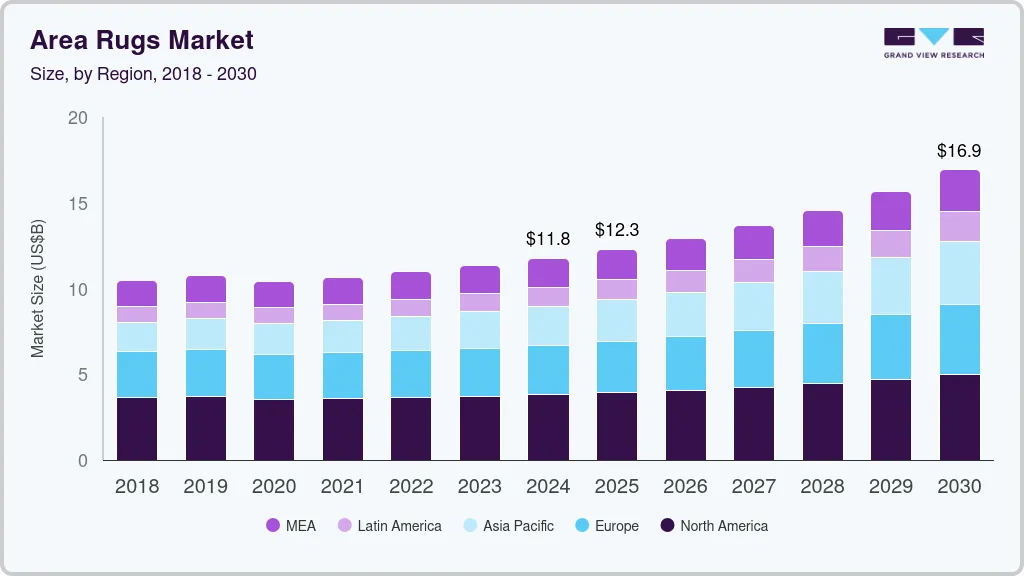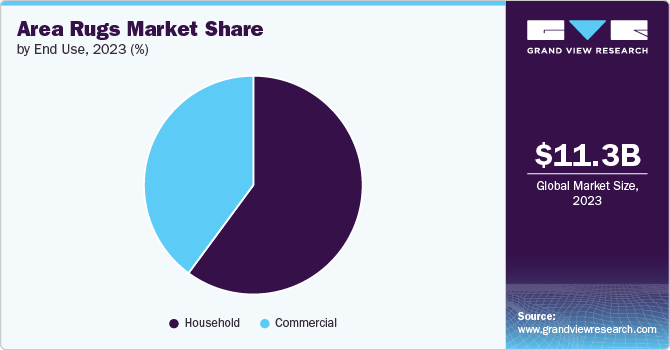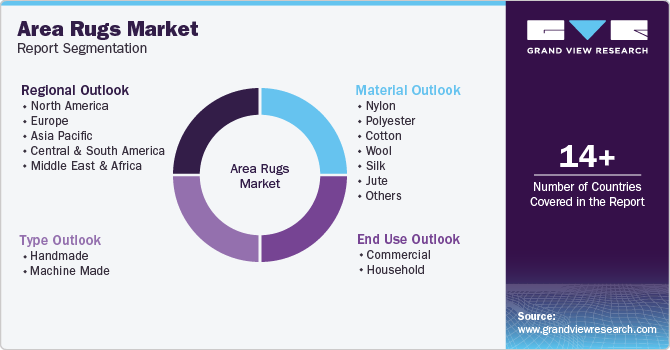- Home
- »
- Homecare & Decor
- »
-
Area Rugs Market Size, Share And Growth Report, 2030GVR Report cover
![Area Rugs Market Size, Share & Trends Report]()
Area Rugs Market (2025 - 2030) Size, Share & Trends Analysis Report By Material (Nylon, Polyester, Cotton, Wool, Silk, Jute), By Type (Handmade, Machine Made), By End Use (Commercial, Household), By Region, And Segment Forecasts
- Report ID: GVR-4-68040-472-8
- Number of Report Pages: 110
- Format: PDF
- Historical Range: 2018 - 2023
- Forecast Period: 2025 - 2030
- Industry: Consumer Goods
- Report Summary
- Table of Contents
- Segmentation
- Methodology
- Download FREE Sample
-
Download Sample Report
Area Rugs Market Summary
The global area rugs market size was estimated at USD 11.77 billion in 2024 and is projected to reach USD 16.91 billion by 2030, growing at a CAGR of 6.6% from 2025 to 2030. An increase in construction and real estate activities significantly drives the market as new homes and commercial spaces require extensive interior furnishings to create inviting and functional environments.
Key Market Trends & Insights
- North America dominated the global area rugs market with the largest revenue share of over 38% in 2023.
- The area rugs market in the U.S. accounted for a market share of around 78% in 2023 in the North American market.
- By material, the wool segment led the market, holding the largest revenue share of over 30% in 2023.
- By type, the handmade segment is expected to grow at the fastest CAGR of 7.1% from 2024 to 2030.
- By end use, the household segment accounted for a market share of around 60% in 2023.
Market Size & Forecast
- 2024 Market Size: USD 11.77 Billion
- 2030 Projected Market Size: USD 16.91 Billion
- CAGR (2025-2030): 6.6%
- North America: Largest market in 2023
As builders and developers focus on enhancing the aesthetic appeal of properties, area rugs become essential elements in interior design, providing warmth, comfort, and style. This heightened demand encourages consumers to invest in a variety of rugs that complement their decor, catering to diverse tastes and preferences. Additionally, the growing trend of open concept living spaces increases the need for area rugs to delineate different areas, further propelling market growth.Innovations in manufacturing techniques, particularly for machine-made rugs, have significantly enhanced the quality, durability, and design options available in the area rugs market, driving consumer interest and sales. Advanced technology allows for precise and intricate designs to be produced at a lower cost, enabling manufacturers to offer a wide variety of styles, colors, and patterns that appeal to diverse consumer preferences. Improvements in materials, such as the development of stain-resistant and fade-resistant fibers, have increased the durability and longevity of these rugs, making them suitable for high-traffic areas in both residential and commercial settings.

Moreover, the availability of a wide array of designs, sizes, colors, and patterns in the market is a significant driver of consumer interest and purchasing behavior. This diverse selection enables consumers to find rugs that perfectly align with the personal style and the unique aesthetics of spaces. As homeowners and businesses increasingly prioritize individualized decor that reflects tastes, the ability to customize choices fosters a deeper emotional connection to the products. This trend encourages consumers to invest in multiple rugs for different areas of homes or offices, further boosting market demand.
The sustainability trend in the market is gaining momentum as consumers become increasingly conscious of their environmental impact and seek eco-friendly home furnishings. This shift is reflected in a growing demand for rugs made from natural, renewable, and recycled materials, such as organic cotton, jute, and reclaimed fibers. Manufacturers are responding by adopting sustainable production practices, minimizing waste, and using non-toxic dyes, which appeal to eco-conscious buyers but also contribute to healthier indoor environments. Additionally, the rise of certifications and labels indicating sustainable sourcing and manufacturing processes further enhances consumer trust and encourages informed purchasing decisions. As the focus on sustainability continues to shape consumer preferences, the area rugs market is increasingly aligning with these values, leading to innovation and growth in the sector while promoting responsible consumption.
Material Insights
Wool area rugs accounted for a share of around 30% in 2023. Wool rugs are renowned for ability to withstand wear and tear, making it ideal for high-traffic areas in both residential and commercial settings. Additionally, wool is naturally stain-resistant, flame-retardant, and hypoallergenic, which enhances its attractiveness to consumers seeking functional and safe home furnishings. The natural insulation properties of wool also contribute to energy efficiency, making these rugs a preferred choice for eco-conscious buyers. Furthermore, the growing trend towards sustainable and organic materials in home decor supports the demand for wool rugs, as they are biodegradable and produced through renewable resources.
The demand for nylon area rugs is expected to grow at CAGR of 7.9% from 2024 to 2030. The growing demand for nylon area rugs can be attributed to exceptional durability, stain resistance, and ease of maintenance, making an ideal choice for both residential and commercial spaces. Nylon rugs are known for ability to withstand high foot traffic, which makes it particularly popular in households with children and pets. Additionally, the availability of a wide range of colors, patterns, and textures allows consumers to easily incorporate nylon rugs into various interior design styles. The affordability of nylon compared to natural fibers also appeals to budget-conscious buyers, further driving its popularity.
Type Insights
Machine made area rugs accounted for a share of around 60% in 2023. Machine-made rugs offer a cost-effective alternative to handcrafted options, making it accessible to a wider range of consumers. The production techniques used in machine manufacturing ensure uniformity in patterns, colors, and textures, which appeals to buyers seeking reliable quality and aesthetic appeal. Additionally, advancements in technology have allowed for intricate designs and styles to be created with high precision, catering to diverse interior decor preferences. The ease of maintenance and durability of machine-made rugs, often crafted from synthetic fibers that are resistant to stains and wear, further enhance attractiveness, favoring the segment growth.
The demand for handmade area rugs is expected to grow at CAGR of 7.1% from 2024 to 2030. Handmade rugs are often seen as works of art, showcasing intricate designs, patterns, and traditional weaving techniques that reflect the artisan's skill and creativity. This uniqueness appeals to consumers who desire distinctive pieces that can enhance home decor and serve as conversation starters. Additionally, the increasing awareness of sustainability and eco-friendly practices has led many buyers to favor handmade rugs, which are typically produced using natural materials and traditional methods that have a lower environmental impact compared to mass-produced options, impacting positively to the growth of the market.
End Use Insights
Area rugs for household end use accounted for a market share of around 60% in 2023. Homeowners increasingly recognize the impact of area rugs on enhancing interior design, providing warmth, and defining spaces within open floor plans. The rise in home improvement projects and renovations, especially during the pandemic, has further fueled demand, as individuals seek to create cozy and inviting environments. Additionally, the growing trend of personalizing living spaces through unique designs, textures, and colors encourages consumers to invest in area rugs that reflect individual style, favoring the market growth.

Commercial application segment is expected to grow at a CAGR of 7.2% from 2024 to 2030. Businesses increasingly recognize the role of area rugs in improving acoustics, reducing noise levels, and providing a welcoming atmosphere in spaces such as offices, hotels, and retail establishments. The demand for versatile and durable flooring solutions that can withstand high foot traffic while maintaining visual appeal also contributes to market expansion. Additionally, the trend towards sustainable and eco-friendly materials in commercial settings aligns with corporate social responsibility initiatives, prompting businesses to invest in area rugs that reflect these values, likely driving the market growth.
Regional Insights
The market in North America accounted for a market share of around 38% in 2023 in the global market. The North America market for area rugs is driven by increasing demand for home décor products and a growing interest in personalized interior design. Consumers are seeking versatile and aesthetically pleasing rugs to enhance living spaces, with a rising preference for eco-friendly and sustainable materials such as jute, sisal, and wool. Major players in the region, like Mohawk Industries and Shaw Industries, dominate due to their expansive product portfolios and strong retail presence. The growth of e-commerce and home improvement trends, especially post-pandemic, has further fueled demand, with customization and design variety playing key roles in consumer preferences.
U.S. Area Rugs Market Trends
The area rugs market in the U.S. accounted for a market share of around 78% in 2023 in the North American market. Rising disposable incomes and a shift towards personalized home décor have led to increased spending on home furnishings. Sustainability is also a key driver, with consumers seeking eco-friendly, natural fiber rugs like wool and jute. Additionally, the growth of e-commerce has made a wide range of designs, sizes, and price points easily accessible, encouraging more frequent rug purchases. Seasonal trends and the popularity of DIY home improvement further contribute to the market's growth.
Asia Pacific Area Rugs Market Trends
The area rugs market in Asia Pacific accounted for revenue share of around 20% of global revenue in 2023. The market in the Asia Pacific region is driven by increasing urbanization, growing disposable incomes, and a rising focus on home decor and interior aesthetics. The surge in real estate activities and demand for personalized and sustainable home furnishing solutions also fuel market growth. In countries like China, India, Japan, Australia, and South Korea, the expanding middle class and a shift toward modern and eco-friendly designs are key factors influencing the demand for area rugs.
Europe Area Rugs Market Trends
The Europe area rugs market is expected to grow a CAGR of 5.9% from 2024 to 2030. Factors such as a growing emphasis on home interior design, increased consumer spending on home furnishings, and a rising trend toward sustainable and eco-friendly products, drives the growth of the market. The demand for unique and customizable designs also plays a significant role. Major companies in the European market include Mohawk Industries, IKEA, The Rug Company, and Ruggable, which contribute to innovation and variety in styles, materials, and production techniques, catering to diverse consumer preferences across the region.
Key Area Rugs Company Insights
The competitive landscape in the market is characterized by a mix of established global players and emerging local brands. Key players like Mohawk Industries, and Shaw Industries hold a significant market share due to their wide range of products, strong distribution networks, and focus on innovation. The market is driven by growing consumer demand for home décor and customization, pushing companies to offer more sustainable, eco-friendly, and diverse design options. Additionally, e-commerce platforms and direct-to-consumer strategies have intensified competition, as brands aim to reach a broader audience with affordable, stylish, and high-quality rugs.
Key Area Rugs Companies:
The following are the leading companies in the area rugs market. These companies collectively hold the largest market share and dictate industry trends.
- Mohawk Industries, Inc.
- Shaw Industries Group, Inc.
- Harounian Rugs International (HRI)
- Balta Industries NV
- Milliken
- The Natural Carpet Company
- Nourison
- Capel Rugs
- The Dixie Group
- Agnella
Recent Developments
-
In May 2024, FLOR announced the launch of new area rug styles designed to welcome the summer season. This release features a vibrant collection of customizable rugs that reflect the latest design trends while maintaining the brand's commitment to sustainability. The new offerings aim to enhance interior spaces, combining aesthetics with functionality, and provide consumers with fresh options for their home décor.
-
In February 2024, Rugs USA introduced its new made-to-order rugs program, branded as "Custom by Rugs USA." This initiative allows customers to design their own rugs, offering a wide range of materials, colors, and sizes to create personalized home décor solutions. The program emphasizes quality craftsmanship and the ability to cater to individual tastes, enabling consumers to enhance their living spaces with unique, custom-made rugs that reflect their personal style.
Area Rugs Market Report Scope
Report Attribute
Details
Market size value in 2025
USD 12.29 billion
Revenue forecast in 2030
USD 16.91 billion
Growth Rate
CAGR of 6.6% from 2025 to 2030
Actual Data
2018 - 2023
Forecast period
2025 - 2030
Quantitative units
Revenue in USD Billion, and CAGR from 2025 to 2030
Report coverage
Revenue forecast, company ranking, competitive landscape, growth factors, and trends
Segments covered
Material, type, end use, region
Regional scope
North America; Europe; Asia Pacific; Central & South America; Middle East & Africa
Country scope
U.S.; Canada; Mexico; UK; Germany; France; Italy; Spain; Japan; China; India; Brazil; Argentina; Saudi Arabia; South Africa
Key companies profiled
Mohawk Industries, Inc.; Shaw Industries Group, Inc.; Harounian Rugs International (HRI); Balta Industries NV; Milliken; The Natural Carpet Company; Nourison; Capel Rugs; The Dixie Group; Agnella
Customization
Free report customization (equivalent up to 8 analysts working days) with purchase. Addition or alteration to country, regional & segment scope.
Pricing and purchase options
Avail customized purchase options to meet your exact research needs. Explore purchase options
Global Area Rugs Market Report Segmentation
This report forecasts revenue growth at the global, regional and country levels and provides an analysis of the latest industry trends and opportunities in each of the sub-segments from 2018 to 2030. For the purpose of this study, Grand View Research has segmented the area rugs market report on the basis of material, type, end use, and region.

-
Material Outlook (Revenue, USD Billion; 2018 - 2030)
-
Nylon
-
Polyester
-
Cotton
-
Wool
-
Silk
-
Jute
-
Others
-
-
Type Outlook (Revenue, USD Billion; 2018 - 2030)
-
Handmade
-
Machine Made
-
-
End Use Outlook (Revenue, USD Billion; 2018 - 2030)
-
Commercial
-
Household
-
-
Regional Outlook (Revenue, USD Billion; 2018 - 2030)
-
North America
-
U.S.
-
Canada
-
Mexico
-
-
Europe
-
UK
-
Germany
-
France
-
Italy
-
Spain
-
-
Asia Pacific
-
China
-
Japan
-
India
-
-
Central & South America
-
Brazil
-
Argentina
-
-
Middle East & Africa
-
South Africa
-
Saudi Arabia
-
-
Frequently Asked Questions About This Report
b. North America dominated the area rugs market with a share of around 32% in 2023. The area rugs market in North America is driven by a combination of increasing home renovation and remodeling activities, a growing trend toward personalized interior design, and rising consumer spending on home furnishings.
b. Key players in the area rugs market are Mohawk Industries, Inc.; Shaw Industries Group, Inc.; Harounian Rugs International (HRI); Balta Industries NV; Milliken; The Natural Carpet Company; Nourison; Capel Rugs; The Dixie Group; and Agnella.
b. Key factors that are driving the area rugs market growth include rising consumer interest in home decor, growing disposable incomes, the expansion of e-commerce platforms, and increasing demand for sustainable, customizable, and functional home furnishings.
b. The global area rugs market was estimated at USD 11.34 billion in 2023 and is expected to reach USD 11.77 billion in 2024.
b. The global area rugs market is expected to grow at a compound annual growth rate of 6.2% from 2023 to 2030 to reach USD 16.91 billion by 2030.
Share this report with your colleague or friend.
Need a Tailored Report?
Customize this report to your needs — add regions, segments, or data points, with 20% free customization.

ISO 9001:2015 & 27001:2022 Certified
We are GDPR and CCPA compliant! Your transaction & personal information is safe and secure. For more details, please read our privacy policy.
Trusted market insights - try a free sample
See how our reports are structured and why industry leaders rely on Grand View Research. Get a free sample or ask us to tailor this report to your needs.










